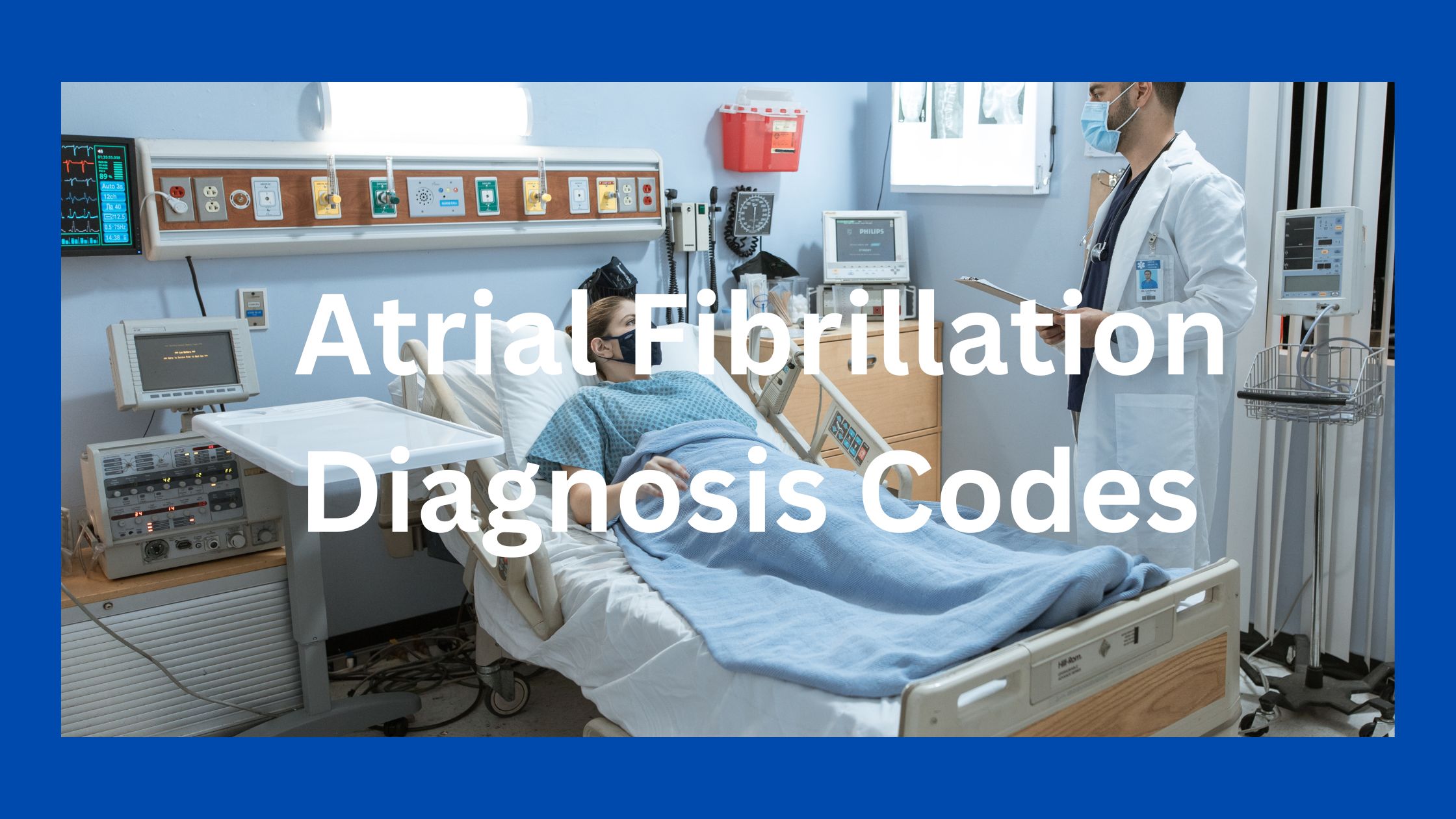Atrial fibrillation (AFib) is an irregular heartbeat, or arrhythmia, that can increase the risk of a range of heart-related health complications. It occurs when the upper chambers of the heart (the atria) begin to quiver instead of beating normally. This rapid and irregular pulsation makes it more difficult for blood to flow through the atria, resulting in pooling and an increased risk of blood clots.
According to reports, in 2019, AFib was mentioned on 183,321 death certificates and was the underlying cause of death in 26,535 of those deaths, and it is estimated that 12.1 million Americans may be affected by it in 2030.
List of Atrial Fibrillation ICD 10 Codes
- I48.91 Unspecified atrial fibrillation: For cases of atrial fibrillation where the exact type is not specified.
- I48.0 Paroxysmal atrial fibrillation: This code describes cases of atrial fibrillation that begin and end suddenly and spontaneously.
- I48.1 Persistent atrial fibrillation: This code is applied when the atrial fibrillation continues for a prolonged period, typically lasting more than seven days.
- I48.11 Longstanding persistent atrial fibrillation: Used for cases of persistent atrial fibrillation that have been ongoing for an extended duration.
- I48.19 Other persistent atrial fibrillation: This code is for cases of persistent atrial fibrillation that don’t fit into the longstanding persistent atrial fibrillation category.
- I48.2 Chronic atrial fibrillation: This code is assigned to atrial fibrillation cases considered ongoing and long-term.
- I48.20 Unspecified chronic atrial fibrillation: When the specific type of chronic atrial fibrillation is not specified in the medical records, this code may be used.
- I48.21 Permanent atrial fibrillation: Used when atrial fibrillation is present and considered irreversible or permanent.
- I48.3 Typical atrial flutter: This code represents a specific type of atrial flutter that follows a characteristic pattern.
- I48.4 Atypical atrial flutter: Assigned to cases of atrial flutter that deviate from the typical pattern.
- I48.9 Unspecified atrial fibrillation and atrial flutter: This code is used when the medical documentation doesn’t specify the exact type of atrial arrhythmia.
- I48.92 Unspecified atrial flutter: This code is used when the type of atrial flutter is not indicated in the medical records.
- I49 Other cardiac arrhythmias: This code covers heart rhythm disturbances not categorized elsewhere.
- I49.0 Ventricular fibrillation and flutter: Used for cases involving abnormal heart rhythms in the heart’s ventricles.
- I49.01 Ventricular fibrillation: Assigned when the ventricles experience rapid, chaotic, and irregular heartbeats.
- I49.02 Ventricular flutter: Used when the ventricles exhibit rapid but regular heartbeats.
- I49.1 Atrial premature depolarization: Assigned for early electrical impulses originating in the heart’s atria.
- I49.2 Junctional premature depolarization: This code covers early electrical impulses arising in the junctional areas of the heart.
- I49.3 Ventricular premature depolarization: Used when early electrical impulses occur in the heart’s ventricles.
- I49.4 Other and unspecified premature depolarization: This code is for other or unspecified cases of premature heartbeats.
- I49.40 Unspecified premature depolarization: Used when the specific type of premature depolarization is not specified in the medical records.
For check Complete list of ICD10 Codes 2023 please visit,
Experience of patients with atrial fibrillation
“My heart flip-flops, palpitates, and feels like it’s banging against my chest wall, especially if I’m carrying stuff up or down my stairs or bending over.”
“I was nauseous, light-headed and weak. My heart was beating very fast and I felt like I was gasping for air.”
Causes of Atrial Fibrilation
Atrial fibrillation (AFib) is a common and serious type of irregular heartbeat that can lead to serious health problems. It can increase the risk of stroke, heart attack and death. Some of the main reasons for this are shown below-
◆High blood pressure- High blood pressure for a long time can put pressure on the heart, due to which the heartbeat can be disturbed.
◆Pulmonary Embolism- This is a medical term for blood clotting.
◆ Cardiovascular diseases such as heart valve disease, heart failure, coronary artery disease and heart attack are among its causes.
◆ Regularly consuming high amounts of alcohol can put people at highest risk of atrial fibrillation.
◆ Other toxic drugs, such as methamphetamine, can also cause A-fib.
◆ If you have a family history of this disease, then that can also be the reason.
Test Yourself : Personal EKG Monitor for Home use (AFIB Monitoring Device)
Effects of Atrial Fibrillation on body.
◆Due to atrial fibrillation, the rhythm of your heartbeats becomes unbalanced due to which the risk of heart related diseases like stroke, heart attack increases.
◆ Lungs require stable blood circulation to function properly, lungs do not function properly due to irregular pumping of the heart.
◆Having atrial fibrillation increases the risk of stroke because when the heart does not work properly, blood accumulates in the atria of the heart. And when a clot forms, it can travel to the brain, where it can block the blood supply, increasing the risk of an embolic stroke.
Symptoms of Atrial fibrillation.
Atrial fibrillation, or AFib, is a condition that causes abnormal electrical signals in the heart to disturb the normal rhythm of the heartbeat. This irregular and sometimes rapid pulse causes poor blood circulation throughout the body. This can lead to further clot formation which increases the risk of stroke. As a result, patients with AFib experience the following symptoms:
◆low blood pressure, dizziness, lightheadedness and fainting etc.
◆ One can experience chest pain, palpitations and even shortness of breath.
◆Experiencing confusion
◆Fluttering in the chest.
How to protect yourself from Atrial Fibrilation?
To protect yourself from atrial fibrillation, it is necessary to follow a healthy diet, maintain a proper weight. Additionally, avoiding nicotine and alcohol use, exercising regularly, managing stress levels, and quitting smoking can reduce the risk. Also, taking prescribed medicines on time can save from this. In addition, individuals should go for regular checkups with their healthcare provider to monitor for signs of abnormal heart rhythms and promptly treat any abnormalities detected by their doctor. Those who have had or are currently suffering from it and are taking certain medications may require more close monitoring. Taking the time to properly manage these lifestyle elements can significantly reduce your risk of atrial fibrillation.
Read a Book : The AFib Cure: Get Off Your Medications
Conclusion:
Through today’s post, we learned what is atrial fibrillation, what causes atrial fibrillation and what are its symptoms, as well as we also learned how to protect ourselves from atrial fibrillation and its effects on the body. AFib occurs when abnormal electrical signals cause the atria in the heart to contract quickly and chaotically instead of a steady rhythm, if such If it is properly managed, its risks can be reduced and if it is left untreated, it increases the risk of heart diseases and stroke.
Related Articles:
ICD 10 Code for Insomnia |What are the main causes of insomnia?
ICD 10-CM code for Cardiomyopathy I42.9
HFREF ICD-10 Code|Heart Failure with Reduced Ejection Fraction


